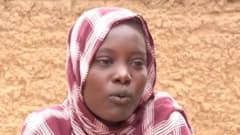Surviving Amidst Chaos: The Human Toll of Sudan's Civil Strife
 The Tech Times
The Tech Times
In the heart of Africa, where the sands of the Sahara meet the lush banks of the Nile, lies Sudan—a country whose beauty is marred by decades of political unrest and civil conflict. This turmoil has left indelible marks on its people, as demonstrated by the harrowing tale of a 19-year-old who recently shared her ordeal with the BBC. Through her story, we gain a sobering glimpse into the lived realities amidst Sudan's ongoing civil war, particularly in the beleaguered region of Darfur.
The young woman recounted how she suffered a miscarriage while fleeing continuous airstrikes targeting her community. This personal tragedy, compounded by the broader chaos enveloping her homeland, underscores the profound human cost of Sudan’s protracted conflicts. Yet, her resilience shines through as she describes rescuing a child amidst the bombardments, illustrating both the dire circumstances and the indomitable spirit of those affected.
A Nation in Turmoil
Sudan has been embroiled in conflict for decades, with the Darfur crisis being one of its most prolonged and devastating chapters. The conflict in Darfur began in 2003 when ethnic African rebel groups rose against the Arab-dominated Sudanese government, citing marginalization and neglect. In response, the government, allegedly in collaboration with the notorious Janjaweed militias, waged a brutal campaign that led to accusations of genocide, war crimes, and crimes against humanity. Despite international efforts to broker peace, violence has persisted, flaring periodically and displacing millions.
The story of the 19-year-old from Darfur is reflective of the broader human rights crisis that has gripped Sudan. The ongoing civil war has not only decimated infrastructure but also left a psychological scar on its citizens. Women and children are particularly vulnerable, often bearing the brunt of the violence and instability that engulfs their communities.
The Human Cost of Conflict
The narrative of survival amidst constant threat is not unique to this young woman. Across Sudan, countless others face similar plights, caught in a cycle of fleeing and rebuilding, only to have their lives disrupted once again. The United Nations estimates that millions remain displaced within the borders of their own country, living in overcrowded camps, often with limited access to basic necessities such as food, water, and medical care.
The historical context of Sudan's internal strife is rooted in colonial legacies, ethnic diversity, and economic disparities. The British-Egyptian condominium that ruled Sudan until 1956 left behind a fractured society, with deep-seated divisions that have often been exploited by successive governments. These historical grievances have been compounded by the discovery of oil, which, instead of ushering in prosperity, has often fueled further conflict.
A Call for Global Attention
The story shared by the young woman from Darfur is a poignant reminder of the urgent need for international attention and intervention. While the world has seen some efforts to alleviate the suffering of Sudan's people—such as humanitarian aid and peacekeeping missions—these have often fallen short in addressing the root causes of the conflict.
As global citizens, it is imperative to advocate for sustainable solutions that prioritize peace-building and reconciliation. This includes supporting transparent governance, equitable resource distribution, and investing in the socio-economic development of marginalized regions like Darfur.
In conclusion, the tale of survival and resilience from Sudan is a call to action for the world community. It demands that we do not turn a blind eye to the suffering of millions and that we work collectively to build a future where stories of loss and survival are replaced by those of peace and prosperity.
Source: 'I lost a baby and then rescued a child dodging air strikes in Sudan's civil war'
Subscribe to my newsletter
Read articles from The Tech Times directly inside your inbox. Subscribe to the newsletter, and don't miss out.
Written by
